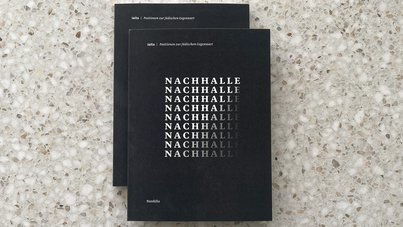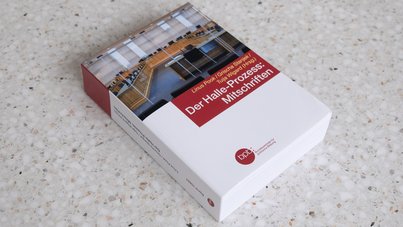Halle-Trial: Closing Statement by Christina Feist
“Germany has an anti-Semitism and racism problem. That is a fact we cannot ignore any longer.”
Your Honour,
Dear co-plaintiffs,
Ladies and gentlemen,
I should like to start by briefly looking back:
Over the past five months since the trial began, I have repeatedly received messages on social media. Initially and throughout the summer, those messages trivialised the events
of 9th, October 2019 and called into question my perception and assessment of the current
political situation in Germany.
However, I also received queries that sounded genuinely astonished, sent by people who live in Germany and simply could not believe that democracy and an open society are in such a dire state in this country. They came from people who are reluctant to admit that right-wing ideologies are still widespread across Germany and that anti-Semitism and racism are still deeply rooted in this society, even after the Shoah.
A few weeks ago, I received the first openly anti-Semitic and misogynist hate message. The tone had rapidly shifted from “What are you all making such a fuss about when nothing happened to you Jews anyway?” to become “Fuck you, you damned Jewess.”
In July, after the first day of the court proceedings, a user on Facebook asked whether the situation in Germany is really so bad. I would like to reply to that question once again today: “Yes, it is.”
Germany has an anti-Semitism and racism problem. That is a fact we cannot ignore any longer. That is an insight that has become apparent in this trial, if not before. Although these right-wing ideologies have been around for a long time, people nonetheless question whether they exist, while the threat they pose and the extent to which they are present are also played down.
The recurring narrative of the so-called poor crazy lone perpetrator has also been refuted once and for all in this trial. That however was not thanks to testimony from public officials from the Federal Criminal Police Office (BKA) or from police officers, but rather thanks to the experts summoned to testify: Karolin Schwarz, journalist; Benjamin Steinitz, Head of the Department for Research and Information on Anti-Semitism (RIAS); and Matthias Quent, founding Director of the Institut für Demokratie und Zivilgesellschaft [Institute for Democracy and Civil Society] in Jena.
In my testimony in September, I talked about having lost any trust whatsoever in Germany and in the rule of law here because of the way the police treated us on the day of the attack. So far, nothing has changed in that respect in the course of this trial.
The incredible reluctance with which most of the police officers and BKA officials who were summoned have testified in this courtroom, along with their shocking ignorance about online radicalisation, which has come to light here, destroyed any hope I might have had that things could get better or at least be approached differently.
In recent months, both here in the courtroom and outside it, I have talked repeatedly about responsibility.
It appears almost excessive to require that you, Your Honour, along with everyone in this courtroom, should take on responsibility on behalf of Germany – on behalf of politicians and of society. But only almost excessive.
For you, just like us, are also part of Germany. Despite our trauma, despite our weariness and exhaustion, we, the people directly affected, the co-plaintiffs in this trial have taken on the task of stating what the majority outside this courtroom is so unwilling to admit: The defendant is not a lone perpetrator.
The attack on 9th, October 2019 was not an isolated incident.
Anti-Semitism, racism and misogyny are not new phenomena and are most certainly not mere
misconceptions, but form part of a right-wing extremist ideology that poses a constant threat to democracy.
People who do not face up to these realities trivialise the danger and scope of right-wing ideology.
People who continue to stubbornly deny these realities play down a despicable attack, such as
the one in Halle, and thus ultimately also pour scorn on those affected and the loved ones of those killed in the attack.
It cannot go on like this.
And because things cannot go on like this, remaining silent is not an option. As members of an open
society with democratic values, we cannot afford to turn a blind eye, not even once.
For just looking away will not stop someone from being physically attacked right in front of us; turning a deaf ear will by no means stop people from being bombarded with anti-Semitic or racist insults right next to us; doing nothing does not mean that anti-democratic, anti-Semitic, racist and misogynist ideologies will just evaporate.
We simply cannot afford to sit back and remain silent. We must take a stand again and again, highlighting what is happening and we must never tire of ensuring these issues remain on the agenda.
We have to get involved.
Better times do not come about because of inaction. Bringing about change calls for action, it calls for commitment and above all else it calls for courage, the courage to face uncomfortable facts.
In this trial, Your Honour, you have the final word. And you thus bear an enormous
responsibility. That responsibility, however, also comes with opportunities: the opportunity to
set a good example and face up to responsibility.
And the opportunity to hand down a fitting judgement that is couched in fitting terms.
For there is hardly anything more despicable than shooting an innocent person who is huddled up in a corner, begging to be spared. And there is nothing more cowardly than shooting an innocent person in the back in the middle of the street. Nothing can really compensate for such a heinous murder of two innocent people. And that is why, in my view, there can never be a truly just punishment for such a crime, but only a fitting one.
By handing down a fitting sentence, you would also give me an opportunity to regain my trust, at least to some extent, that the rule of law applies here. You would give me an opportunity to be able to trust and believe that, if it comes to the crunch, I will not be left all alone.
I stand here before you and I am stronger than I was a year ago, stronger than when the trial began. I am standing here because I want to put my trauma behind me. You have offered me the pre-conditions to do so, by listening to all of us, to all those who wanted to speak. And I should like to express my gratitude to you, Your Honour, for that.
However, being able to put my trauma behind me is not just about being able to speak and be heard; it is also above all about pain and suffering being acknowledged.
A fitting judgement, therefore, also entails recognising all the parties affected and acknowledging that they have been affected, giving legal substance and validity to the pain they have experienced and recounted here.
You have an enormous task ahead of you and bear a huge burden, but please, I beg you, do not let this opportunity slip away, do not leave us alone.
You have the final word in this trial, Your Honour. But outside this courtroom, we all have the final word. And by “we”, I mean everyone who has taken part in this trial and continues to do so – judges, lawyers, co-plaintiffs, interpreters, judicial officers, journalists, sound engineers, members of the public.
From now on, we all have a moral obligation that extends far beyond the end of this trial: we must not give in!
We must take a stand again and again, show moral courage, and work indefatigably to uphold our democracy.
We must take what we have seen and heard in this courtroom over the past few months and carry it with us into the outside world and into the future. Blotting it out and forgetting are not an option!
I will never forget 9th October 2019.
Nor will I forget the outcome of this trial.
Above all, I shall remember Jana and Kevin forever.
And because I remember them, I will not remain silent.


